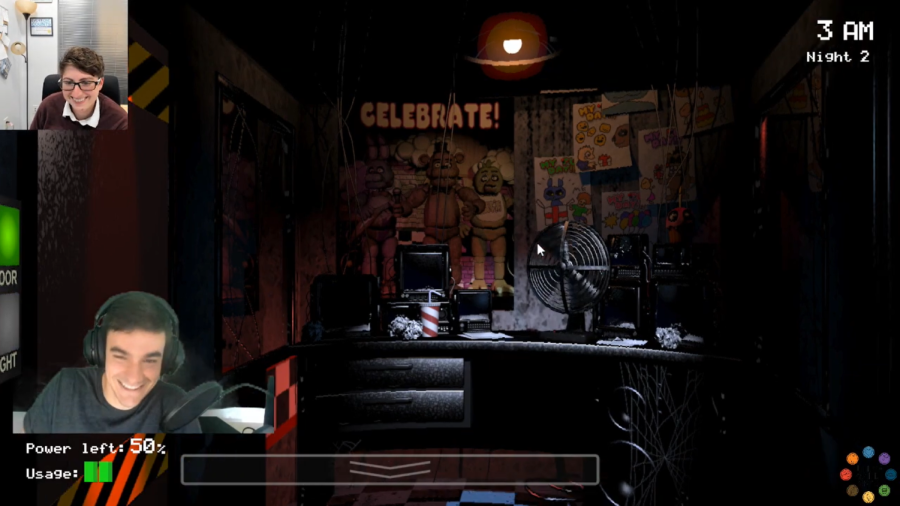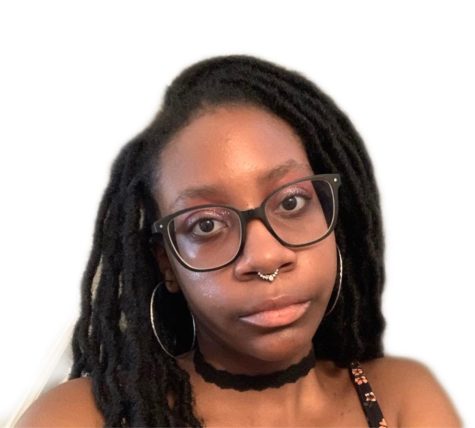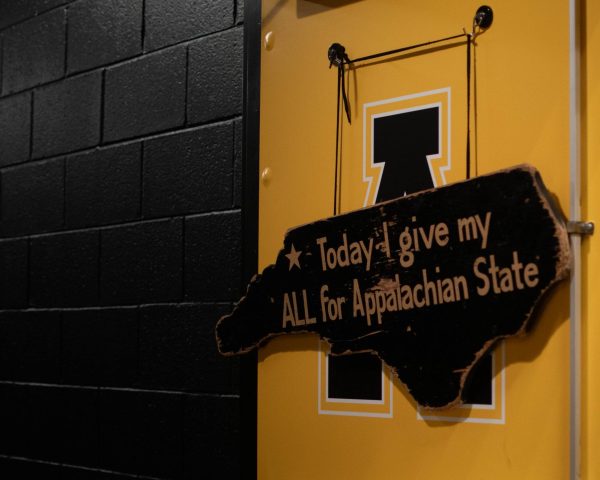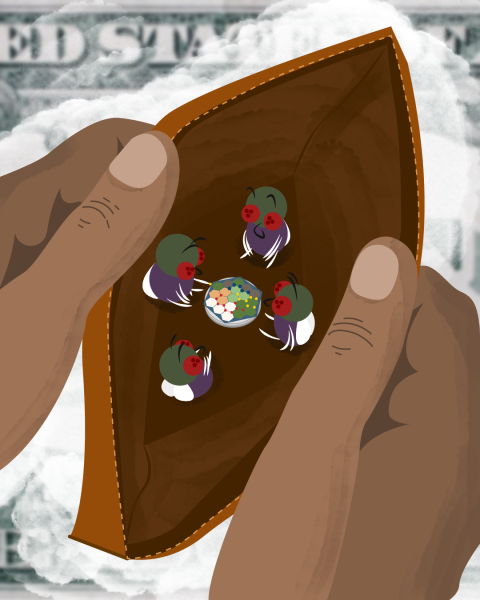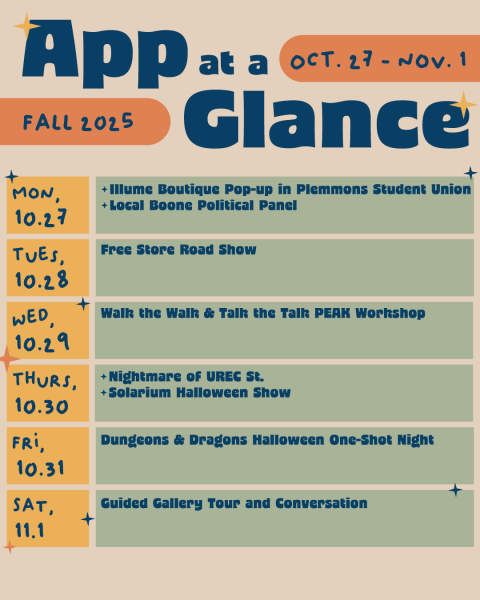Twitch Streams: A new way to address mental health
Courtesy of the Wellness and Prevention Center
Elisabeth Cavallaro watches while Ben Estorge, graduate assistant, plays the popular video game Five Nights at Freddy’s, during a Twitch stream, Oct. 18, 2021.
February 8, 2022
The App State Wellness and Prevention Center is using video games to help address mental health on campus and offer a place of community to students.
The Wellness and Prevention Center combines streaming games on Twitch, with mental health discussions and gives students a space to hear and discuss mental health-related topics. The discussions are hosted through the university’s Discord channel. Once students join the channel, they can access the Wellness and Prevention Center’s live Twitch streams, which allows them to join discussions and video games with their peers.
Elisabeth Cavallaro, assistant director and coordinator for student mental wellness, said she thought of the Twitch streams as a way “to meet students in the middle.” Cavallaro wanted to use the students’ own interests to create a community for open discussions about mental health.
“People are finding community in gaming and a lot of times, people are talking about how they need to be supported and the things going on in their lives,” Cavallaro said.
The Wellness and Prevention Center wanted a relaxing space where students feel welcomed. Cavallaro thought about places where students feel the most comfortable and examined social media, particularly how students flocked to curated online communities.
“We know that’s where a lot of students get their entertainment,” Cavallaro said. “One of our missions of wellness is to meet students where they’re at.”
The idea began before the pandemic when Cavallaro and the director of wellness, Alex Howard, brainstormed ideas to bring wellness discussions to students in an appealing way.
Cavallaro took inspiration from popular activities college students enjoy. Gaming soon came onto her radar.
The Wellness and Prevention Center noticed people forming communities through gaming and discussing mental health in those spaces. Cavallaro and Howard wanted to replicate those natural conversations with App State students using university resources. The original idea was to play video games and talk about wellness, Cavallaro said.
When the university transitioned online, all in-person activities were suspended. Digital interaction became the university’s source of contact between staff and students. Through her research and discussions, Cavallaro decided on Twitch streaming.
With streaming, a community could still be encouraged and promoted while gathering a larger group of people who felt uncomfortable attending in-person events.
When setting up, Cavallaro and Wellness and Prevention Center employees noticed their equipment couldn’t provide the professional quality needed to stream.
The university applied for a grant opportunity from the American College Health Foundation. The ACHF focuses on innovative mental health and wellbeing projects. Upon acceptance, the university purchased the equipment necessary to produce a professional stream.
“We are able to create what is essentially our gaming studio with a green screen, a camera and a microphone,” Cavallaro said.
Cavallaro said the Twitch streams are COVID-19 and introvert-friendly. Students uncomfortable with in-person events can participate from the safety of their room. Inclusivity is the Wellness and Prevention Center’s goal. The streams give extroverted students a chance to open up and speak; while those more reserved can still find comfort in a supportive community.
In college, Cavallaro said she watched her close friends struggle with their mental health and without knowledge of the proper resources, most of them suffered alone.
“I had a lot of friends struggle with mental health issues and they didn’t know where to go,” Cavallaro said. “When I graduated, I wanted to make sure other college students didn’t experience the same thing my friends and I did.”
Users can use a screen name while chatting or viewing the stream, providing anonymity to the audience. Cavallaro said the streams are a great way for anyone looking to engage in mental wellbeing and become active in a like-minded community.
Viewers have the option to join the chat or sit back and observe. All discussions within the chat are moderated by Peer Education Coaches from WE COACH, a program providing peer-to-peer guidance by undergraduate students, to ensure a safe, nurturing and productive environment, according to the university’s WE COACH page.
“We really want to try to create a supportive community on Twitch where people feel they can keep coming back and having these conversations,” Cavallaro said. “We want them to feel like they’re being heard and being listened to.”
The Wellness and Prevention Center held the first stream Jan. 24, where peer wellness coach Brielle Kaluzny played Crash Team Racing with participants and discussed tips for starting the semester off strong and reducing stress.
Kaluzny, who has been a part of WE COACH for seven months, said she thought the concept of online gaming during COVID-19 would get people the help they required while connecting with students.
“It’s a really great way to have a sense of support, especially coming from another peer who has been through the same circumstances,” Kaluzny said. “That close proximity in age can make the students feel comforted like they’re talking to a friend more so than having a nervous reaction to a professional they’ve never met.”
Kaluzny liked the “how close proximity in age” between student and peer wellness coaches bridged the gap between the hosts and participants. Kaluzny wants students to feel at ease while engaging in the streams. She also does not want students to feel nervous joining the Twitch streams.
“It’s just a safe space where if they need anything addressed or have any questions, it can be answered by some wonderful mental health individuals,” Kaluzny said.
“Video games and their effects on mental health can be complex,” said psychology professor Mary Ballard, whose research interests include video games.
“It seems like a great way to draw students into an activity so that Wellness and Prevention Services can introduce mental health topics while students play the games,” Ballard said. “There are more positive outcomes if people use the games to connect socially with others in a way that garners them social support and positive social interactions.”
Kevin Ha, a junior marketing major, said he plays video games on a regular basis. “The program sounds like an amazing idea by App since opening up to people on the internet, especially through gaming, is easier than in real life,” Ha said.
Students can join the next Twitch stream Feb. 21. Kyra Patel, coordinator for student social wellness and the Red Flag Educators, will be discussing relationships, dating, how to set healthy boundaries and communication, according to the Wellness and Prevention Center’s Twitch stream schedule.
The Wellness and Prevention center hosts Twitch streams every other Monday from 7-9 p.m. Students can find stream archives on the Wellness and Prevention Center’s website under Additional Resources — Twitch Streams. New streams are archived for up to 14 days on Twitch.

